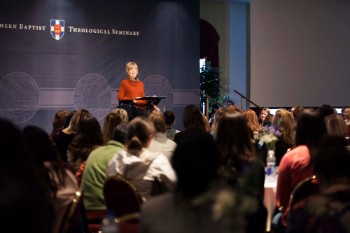
Joni Eareckson Tada speaks on disability ministry at Southern Seminary�s Student Life Conference. (Photo by Candice Watters)
LOUISVILLE — “Go find someone hurting worse than you and help them,” Joni Eareckson Tada said during a two-day visit to Southern Baptist Theological Seminary in Louisville.
Tada, a quadriplegic speaker and author, told her personal story and focused on practical ministry to the disabled by local churches in a talk to 350 Southern Seminary students and their families for a Student Life Conference on Feb. 10.
Tada, founder of Joni and Friends, a ministry seeking to show Jesus’ love to people with disabilities, spoke on a theology of suffering and joy in the midst of pain. While many consider “tastes of heaven” to be when everything goes right, Tada considers tastes of heaven as finding Jesus in the middle of a taste of hell.
“God has not redeemed us to make us happy and healthy; He redeemed us to make us like Jesus,” Tada said.
Tada said people with disabilities bless the church as a source of inspiration by enduring pain-filled lives and providing opportunities for believers to serve them.
Tada and her husband Ken then answered questions about their newest book, “Joni and Ken,” which describes lessons learned through their 35 years of marriage. Both emphasized the daily need to look at the big picture, the “35,000-foot view of life,” instead of becoming overwhelmed by the pain of the moment.
The Tadas said this practice became especially relevant in 2010 when Joni was diagnosed with cancer.
During an Equip women’s event Feb. 11, Tada encouraged SBTS women to have “a heart for those who suffer in ways foreign to you.”
Again sharing her personal story to encourage ministry in the local church, she called for attendees to embody the love of Christ to families and individuals suffering with disabilities.
Describing the diving accident 50 years ago that broke her neck, Tada said she sank into depression after the accident but gradually learned how to respond in faith.
“The weaker I was, the harder I leaned on Jesus, and the harder I leaned on Jesus, the stronger I found Him to be,” she said.
Hurting people do not immediately need biblical answers to their questions of why they suffer, Tada said. The time for biblical answers is when people are asking why with a searching heart instead of with a raised fist.
“God is not quick to give answers,” she said. “But He is quick to give Himself.”
Suffering people want compassion and the presence of a friend, Tada said. “The people who made God real to me” in her trials, Tada said, were those like her high school friend who climbed into the hospital bed and quietly sang the hymn “Man of Sorrows.”
Tada and her team also met with members of Southern Seminary’s biblical counseling department to promote counseling material specifically for helping the disabled and to encourage disability ministry among Southern students. (BP)
Charissa Crotts